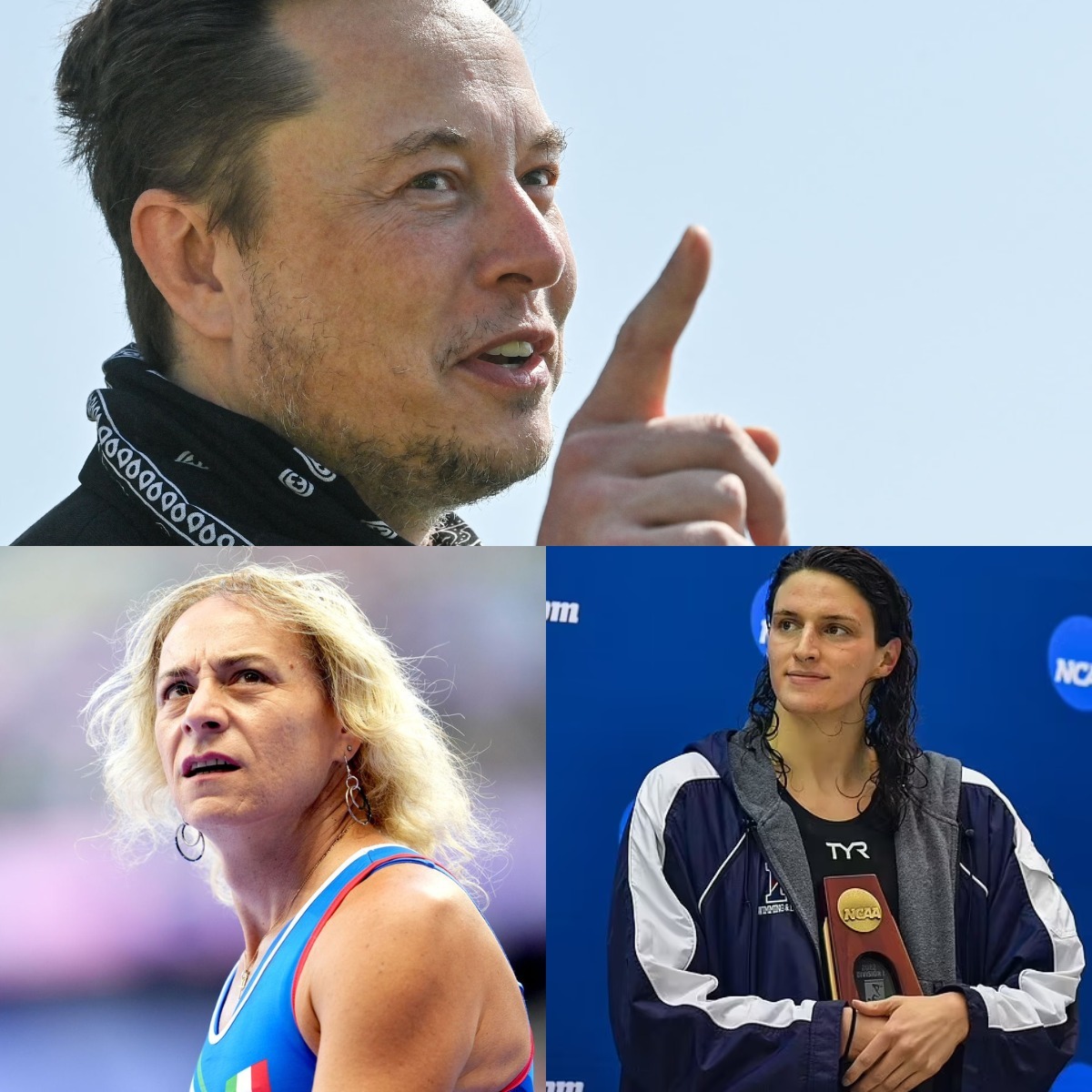Elon Musk, the billionaire CEO of Tesla and SpaceX, has once again thrust himself into the center of a national controversy, but this time it has nothing to do with electric cars, space travel, or artificial intelligence. Instead, Musk set social media ablaze with a blunt and unfiltered statement that read: “NO BIOLOGICAL MAN should compete in women’s sports.”

Within minutes, the post went viral, sparking a firestorm of arguments that quickly spread far beyond Twitter and into mainstream headlines. Musk, known for his willingness to provoke heated conversations, entered one of the most divisive debates of the decade—the question of whether transgender women should be allowed to compete in female sports categories. The timing of his remark only added fuel to the fire. In recent months, discussions surrounding transgender athletes, especially those who transitioned after puberty, have become increasingly contentious.
Advocates of exclusion argue that male puberty provides lasting advantages in strength, endurance, and speed that cannot be erased by hormone treatments, making competition against cisgender women unfair in certain sports. Supporters of inclusion counter that banning transgender athletes is discriminatory, harmful, and undermines their right to equality. Musk’s decision to weigh in appears to have been more than casual commentary; it was a bold statement designed to amplify a conversation already splitting athletes, lawmakers, and the public. Predictably, the reactions came swiftly and loudly from both camps.
Conservatives and those advocating for stricter rules in women’s sports praised Musk for speaking what they see as an uncomfortable truth. They argue that women deserve a level playing field and that transgender participation, particularly in strength-based events, compromises fairness. Musk’s words echoed the long-standing arguments of figures like Sharron Davies, a former Olympic swimmer who has been outspoken about what she describes as the biological unfairness of allowing trans women to compete in female categories. For this group, Musk’s tweet was not only validation but also an opportunity to push for more restrictive policies at both state and national levels.
On the other side, LGBTQ+ advocates, progressive voices, and transgender athletes themselves immediately condemned Musk’s statement as dangerous and demeaning. Critics argued that by using terms like “biological man,” Musk was perpetuating stereotypes that invalidate transgender identities and reinforce stigma. Sarah Kate Ellis, president of GLAAD, called Musk’s words “ignorant and harmful,” warning that with his massive platform, his remarks could normalize transphobia and contribute to the discrimination and violence already faced by transgender people.
Transgender athletes such as Lia Thomas, who became a lightning rod of controversy in collegiate swimming, pushed back as well, emphasizing that their participation in sports is about proving ability and pursuing equality, not undermining competition. For these athletes, Musk’s comments were yet another example of how their humanity is reduced to debates about biology, overshadowing their dedication, training, and love of sport. Musk’s influence in this debate cannot be underestimated. With tens of millions of followers and a reputation for unfiltered opinions, his words spread globally within hours, fueling an already polarized discussion.
While Musk has long been known as a provocateur on issues ranging from free speech to artificial intelligence, this latest controversy feels heavier, as it intersects with deeply personal questions of identity, fairness, and equality. Whether intentional or not, his statement has become a rallying cry for those seeking to restrict trans participation in sports, while also serving as a flashpoint for those defending transgender rights. The political fallout has already begun. Conservative lawmakers have seized on Musk’s words to bolster their calls for legislation barring transgender women from women’s sports categories.
Some have even cited his tweet as evidence of growing support for their position. Meanwhile, progressive lawmakers and advocacy groups have responded by doubling down on efforts to pass stronger protections for transgender athletes, ensuring they are not excluded from school and professional sports. This dynamic highlights how the issue extends far beyond athletics—it is part of a broader cultural and political struggle over gender, rights, and equality in America. For many, the debate over trans athletes represents deeper questions about societal values: What does fairness really mean?
How should inclusivity be balanced with competition? And who gets to decide? Musk’s intervention did not create these questions, but his influence has ensured they are now discussed with greater intensity and urgency. Ultimately, Musk’s tweet is more than a passing remark—it is a moment that reflects the growing fracture lines in sports, politics, and culture. Whether one agrees with him or not, his stance has amplified a debate that shows no signs of cooling down.
The conversation about transgender athletes in women’s sports is now one of the most polarizing issues in modern public life, and Musk’s comments will likely be remembered as a flashpoint in that ongoing battle. For athletes, lawmakers, and activists on both sides, the controversy is far from over. In fact, it may only be just beginning, and Musk’s words will continue to reverberate as society grapples with one of the most contentious debates of our time.





